When it comes to hauling heavy loads, choosing the right vehicle is crucial. Discover the best cars for towing heavy loads, from full-size pickup trucks to heavy-duty SUVs, in this comprehensive guide. Learn about towing capacity, engine power, payload capacity, and additional features to enhance your towing experience.
Whether you’re a professional contractor or an outdoor enthusiast, this guide will equip you with the knowledge to make an informed decision and tackle your towing needs with confidence.
Introduction
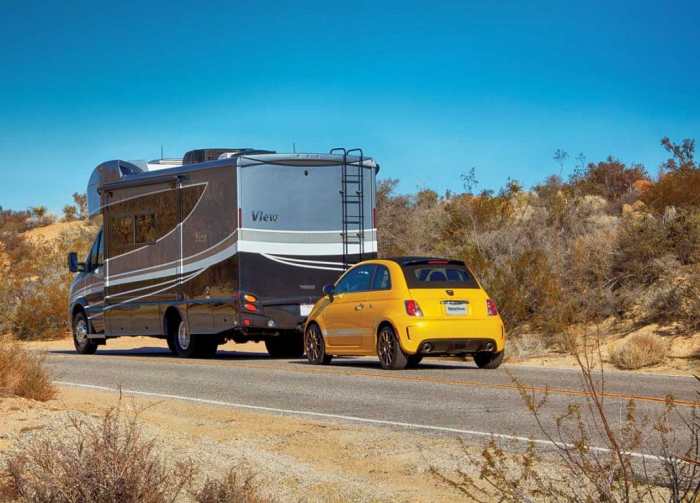
When it comes to towing heavy loads, choosing the right vehicle is paramount. Heavy loads, in this context, refer to anything exceeding 5,000 pounds. Opting for a vehicle with insufficient towing capacity can lead to safety hazards and potential damage to your vehicle.
Matching your vehicle’s towing capacity to the weight of the load ensures a safe and efficient towing experience. It’s crucial to consult your vehicle’s owner’s manual or consult with a towing expert to determine the specific towing capacity of your vehicle.
Key Considerations: Best Cars For Towing Heavy Loads
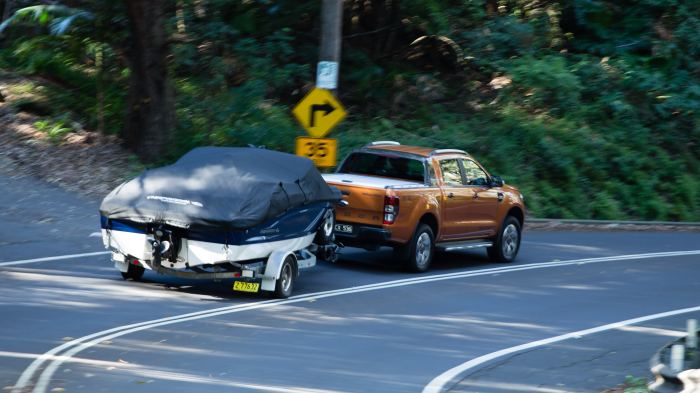
Selecting a vehicle for towing heavy loads requires careful consideration of several key factors. These include the vehicle’s towing capacity, engine power and torque, and payload capacity.
Towing Capacity
Towing capacity refers to the maximum weight a vehicle can pull safely. It is determined by the vehicle’s engine, transmission, frame, and brakes. Exceeding the towing capacity can lead to serious safety hazards, including loss of control, brake failure, and damage to the vehicle.
Engine Power and Torque
Engine power and torque are essential for towing heavy loads. Power measures the engine’s ability to do work, while torque measures its twisting force. Both are important for accelerating and maintaining speed while towing.
Payload Capacity
Payload capacity refers to the weight of the occupants, cargo, and any accessories inside the vehicle. It is important to consider payload capacity when towing, as it affects the vehicle’s overall towing capability. Exceeding the payload capacity can also compromise safety and handling.
Vehicle Categories
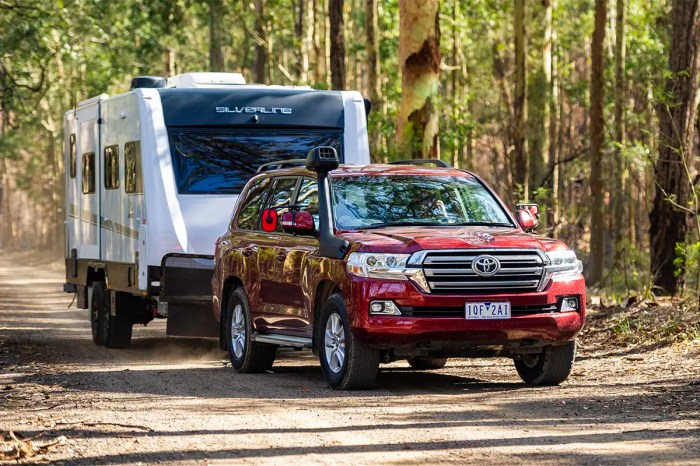
When choosing a vehicle for towing heavy loads, the type of vehicle you select will significantly impact its capabilities and suitability. Here’s an overview of the primary vehicle categories for towing:
Full-Size Pickup Trucks
Full-size pickup trucks are popular choices for towing due to their powerful engines and sturdy construction. They offer impressive towing capacities, typically ranging from 10,000 to 15,000 pounds or more, making them suitable for hauling heavy trailers, boats, and other large loads.
Advantages of full-size pickup trucks for towing include their robust frames, which provide stability and durability while towing. They often come equipped with features such as tow/haul modes, trailer sway control, and integrated brake controllers, enhancing safety and control when towing.
Additionally, their spacious cabins offer ample seating and storage for passengers and gear.
However, full-size pickup trucks can be less fuel-efficient compared to other vehicle types, and their larger size may make them less maneuverable in tight spaces or urban environments.
Heavy-Duty Pickup Trucks
Heavy-duty pickup trucks are designed for the most demanding towing tasks. They feature even more powerful engines and heavy-duty components, enabling them to tow loads exceeding 20,000 pounds or more.
Advantages of heavy-duty pickup trucks for towing include their exceptional towing capabilities, allowing them to handle the heaviest of loads. They often come equipped with advanced towing technologies, such as fifth-wheel and gooseneck hitches, and have reinforced frames and suspensions to withstand the rigors of heavy towing.
However, heavy-duty pickup trucks are typically more expensive than full-size pickup trucks and can be less fuel-efficient. Their larger size and weight may also affect maneuverability and parking ease.
SUVs
SUVs offer a combination of towing capabilities and versatility, making them suitable for a wider range of towing needs. While their towing capacities may not match those of full-size or heavy-duty pickup trucks, they typically range from 3,500 to 8,500 pounds or more, making them capable of towing smaller trailers, boats, and other recreational equipment.
Advantages of SUVs for towing include their comfortable and spacious interiors, providing a more passenger-friendly experience while towing. They often offer features such as all-wheel drive or four-wheel drive, enhancing traction and stability when towing on slippery or off-road surfaces.
Additionally, SUVs are generally more fuel-efficient than pickup trucks, making them a more economical option for lighter towing tasks.
However, SUVs may have limitations in terms of towing capacity compared to pickup trucks, and their smaller cargo beds may restrict the size of items that can be transported.
Popular Models
Among the vast array of vehicles available, certain models stand out as exceptional choices for towing heavy loads. These vehicles boast robust engines, durable chassis, and advanced towing systems that enable them to handle the most demanding tasks.
To provide a comprehensive overview, we have compiled a table showcasing the towing capacities, engine specifications, and payload capacities of popular vehicles in each category. This information will help you make an informed decision when selecting the ideal vehicle for your towing needs.
Light-Duty Trucks
| Make | Model | Towing Capacity | Engine Specifications | Payload Capacity |
|---|---|---|---|---|
| Ford | F-150 | 14,000 lbs | 5.0L V8, 400 hp, 410 lb-ft | 3,250 lbs |
| Chevrolet | Silverado 1500 | 13,300 lbs | 5.3L V8, 355 hp, 383 lb-ft | 2,250 lbs |
| Ram | 1500 | 12,750 lbs | 5.7L V8, 395 hp, 410 lb-ft | 2,300 lbs |
| Toyota | Tundra | 10,200 lbs | 5.7L V8, 381 hp, 401 lb-ft | 1,940 lbs |
| Nissan | Titan | 9,300 lbs | 5.6L V8, 400 hp, 413 lb-ft | 1,630 lbs |
Heavy-Duty Trucks
| Make | Model | Towing Capacity | Engine Specifications | Payload Capacity |
|---|---|---|---|---|
| Ford | F-250 Super Duty | 20,000 lbs | 6.7L Power Stroke V8, 475 hp, 1,050 lb-ft | 4,200 lbs |
| Chevrolet | Silverado 2500HD | 18,500 lbs | 6.6L Duramax V8, 445 hp, 910 lb-ft | 3,979 lbs |
| Ram | 2500 | 19,020 lbs | 6.7L Cummins I6, 370 hp, 850 lb-ft | 4,010 lbs |
| GMC | Sierra 2500HD | 18,500 lbs | 6.6L Duramax V8, 445 hp, 910 lb-ft | 3,979 lbs |
| Nissan | Titan XD | 12,000 lbs | 5.6L V8, 400 hp, 413 lb-ft | 2,480 lbs |
SUVs
| Make | Model | Towing Capacity | Engine Specifications | Payload Capacity |
|---|---|---|---|---|
| Ford | Expedition | 9,300 lbs | 3.5L EcoBoost V6, 400 hp, 480 lb-ft | 2,000 lbs |
| Chevrolet | Tahoe | 8,400 lbs | 5.3L V8, 355 hp, 383 lb-ft | 1,834 lbs |
| Toyota | Sequoia | 7,400 lbs | 5.7L V8, 381 hp, 401 lb-ft | 1,670 lbs |
| Jeep | Grand Cherokee | 7,200 lbs | 5.7L V8, 360 hp, 390 lb-ft | 1,590 lbs |
| Nissan | Armada | 8,500 lbs | 5.6L V8, 400 hp, 413 lb-ft | 1,630 lbs |
Additional Features
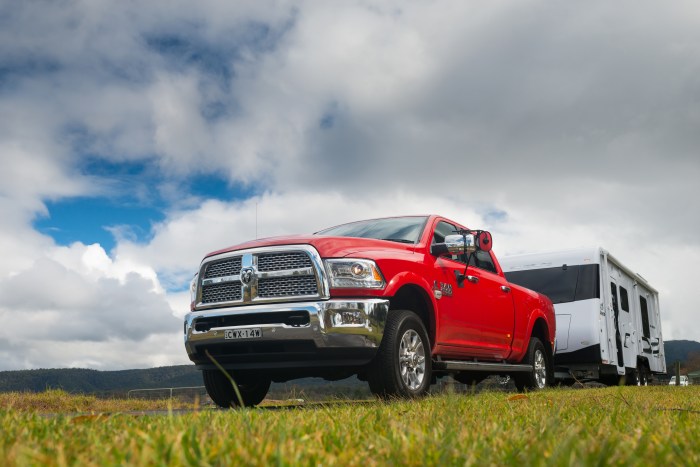
When selecting a vehicle for towing heavy loads, it’s essential to consider additional features that enhance towing capabilities and safety. These features provide greater control, stability, and convenience while towing.
Tow Hitch and Trailer Brake Controller
A tow hitch is a crucial component that connects the vehicle to the trailer. It must be rated for the weight of the trailer being towed. A trailer brake controller is an electronic device that activates the trailer’s brakes in sync with the vehicle’s brakes, ensuring effective and balanced stopping power.
Not all vehicles come equipped with a tow hitch or trailer brake controller, so compatibility with the chosen vehicle is important.
Trailer Sway Control, Best cars for towing heavy loads
Trailer sway is a dangerous phenomenon that can occur when towing, causing the trailer to oscillate from side to side. Trailer sway control is a system that detects and counteracts sway by applying braking force to individual wheels, stabilizing the trailer and preventing potential accidents.
It’s a valuable feature that enhances towing stability and peace of mind.
Fuel Efficiency
Towing a heavy load can significantly impact your vehicle’s fuel consumption. The added weight and increased drag create additional resistance, forcing the engine to work harder and consume more fuel.
Maximizing Fuel Efficiency While Towing
To minimize the impact on fuel efficiency, consider the following tips:
- Choose a vehicle with a powerful engine and a high towing capacity. This will reduce the strain on the engine and improve fuel economy.
- Keep your vehicle properly maintained. Regular oil changes, tire rotations, and air filter replacements can help improve engine efficiency and reduce fuel consumption.
- Avoid excessive acceleration and braking. Smooth, gradual driving habits can improve fuel economy.
- Use cruise control on highways to maintain a steady speed and reduce fuel consumption.
- Consider using a weight-distributing hitch. This device helps distribute the weight of the trailer more evenly, reducing drag and improving fuel efficiency.
- Pack your trailer carefully. Avoid overloading it, as this can increase drag and fuel consumption.
- Use a trailer with aerodynamic features. Streamlined designs can reduce drag and improve fuel economy.
- Consider using a fuel-efficient towing vehicle. Some vehicles are specifically designed for towing and offer improved fuel economy.
Cost Considerations
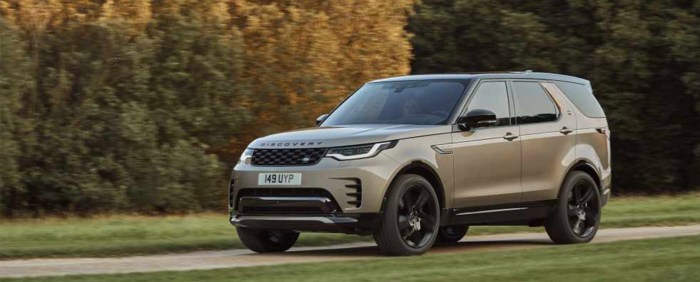
Vehicle Purchase Price
The initial cost of purchasing a vehicle capable of towing heavy loads can vary significantly. Factors such as vehicle category, brand, model, features, and towing capacity influence the price. Research different options to find a balance between your towing needs and budget.
Maintenance and Repair Expenses
Towing heavy loads puts additional strain on a vehicle’s components, including the engine, transmission, brakes, and suspension. Regular maintenance and repairs are crucial to ensure optimal performance and longevity. These costs can be higher for vehicles used for heavy-duty towing compared to those used for lighter loads.
Choosing the Best Vehicle
Selecting the right vehicle for towing heavy loads requires careful consideration of several factors. It’s essential to identify your specific towing needs based on the size and frequency of the loads you’ll be hauling.
Consider the vehicle’s overall performance, including its towing capacity, engine power, and drivetrain. Safety features such as stability control and trailer sway control are also crucial for maintaining control while towing.
Key Factors to Consider
- Towing capacity: Determine the maximum weight the vehicle can safely tow.
- Engine power: Higher horsepower and torque are necessary for towing heavier loads.
- Drivetrain: Four-wheel drive or all-wheel drive provides better traction and stability.
- Safety features: Stability control, trailer sway control, and anti-lock brakes enhance safety while towing.
- Cost-effectiveness: Consider the purchase price, fuel efficiency, and maintenance costs of the vehicle.
Summary
Selecting the best car for towing heavy loads requires careful consideration of your specific needs, vehicle performance, and cost-effectiveness. By understanding the key factors Artikeld in this guide, you can choose the vehicle that will provide you with the power, safety, and efficiency you need to get the job done.
So, whether you’re hauling a boat, trailer, or heavy equipment, let this guide be your roadmap to finding the perfect vehicle for your towing adventures.
FAQ Guide
What is considered a heavy load for towing?
A heavy load for towing typically refers to loads that exceed 5,000 pounds.
Why is it important to choose the right vehicle for towing?
Choosing the right vehicle for towing ensures that your vehicle has the necessary capacity, power, and safety features to safely handle the load you need to tow.
What are the key factors to consider when choosing a vehicle for towing heavy loads?
Key factors include towing capacity, engine power and torque, payload capacity, and additional features such as tow hitch, trailer brake controller, and trailer sway control.